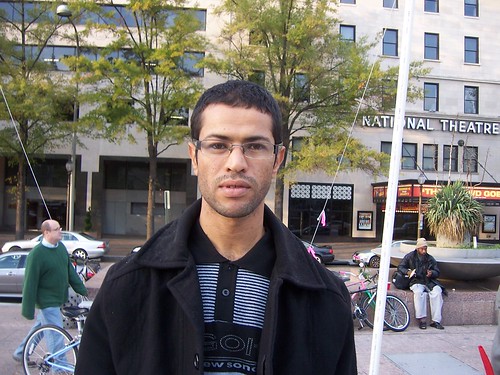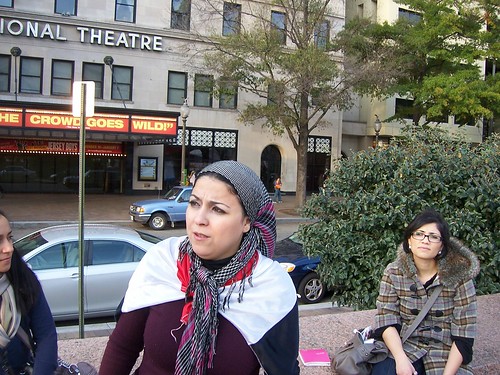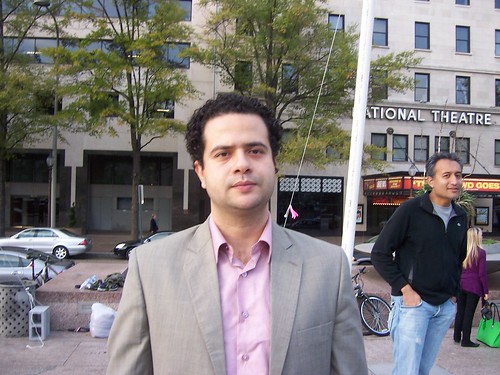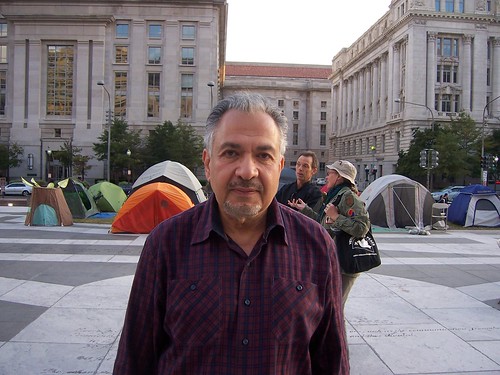Advertisement
 Tunisian trade unionist and activist Jamel Betaeb, winner of the 2011 Democracy Award from the National Endowment for Democracy, spoke with the Columbus Free Press Sunday evening at Freedom Plaza, as a few Arab Spring revolutionaries visited about 70 American Autumn revolutionaries and activists gathered on Freedom Plaza, one of two Occupy DC sites.
Tunisian trade unionist and activist Jamel Betaeb, winner of the 2011 Democracy Award from the National Endowment for Democracy, spoke with the Columbus Free Press Sunday evening at Freedom Plaza, as a few Arab Spring revolutionaries visited about 70 American Autumn revolutionaries and activists gathered on Freedom Plaza, one of two Occupy DC sites.
Wary of being co opted by big unions and the Democratic Party, the Occupy Movement is nonetheless a progressive form of populism. Betaeb and others like him inspire us. They are our counterparts in a global movement for fairness and justice. Our concern about good jobs for our communities is not based on xenophobic anger and fear.
Betaeb said Occupistas are fighting the injustice of increasing economic inequality, a form of political repression that may be less obvious than what he and other Arab Spring revolutionaries have been fighting against.
“People all over the world are beginning to protest against this system, as a minority of people are becoming more and more rich while others are becoming more poor.”
Activists here in DC, and in Occupy encampments all over the country refer to this as “our Tahrir Square." But revolutionaries in Tunisia, Egypt, and Syria have been making sacrifices on a level most US activists aren’t even contemplating.
“People risked their lives. There were hundreds of peaceful demonstrators killed by snipers. People in Tunisia were not able to accept what was happening. They were not able anymore to accept the dictatorship, and being treated not like a human ---no freedom, no human rights, lots of poverty and unemployment, and minimal dignity for the people.”

Israa Abdel Fatah, who was imprisoned for her role in the Egyptian Revolution said there are important differences between the Arab Spring and what some are calling the American Autumn. But she said US activists and those in Egypt can learn from each other.
Fatah’s compatriot, Basem Fathy, who was also imprisoned and had comrades die, agreed with her about the differences between resistance in the US and in Egypt.

“ But maybe the main inspiration in both cases is that nothing is impossible. No Egyptian or international analyst thought Egyptians would make revolution against Mubarek.”
Fathy said people can apply that idea to the US where activists such as us seek to fix an entrenched system of corruption.
He explained his courage by saying “when you are thinking about freedom, you stop thinking about anything else.”
That’s similar to what Fatah said.
“If you belief in what you’re doing, and believe it’s for the sake of your country and the people, you will have the courage,” said Fatah.

Mokhtar Kamel is an activist who has helped from his home here in the US with the resistance against Mubarek.
He helped Egyptian revolutionaries with funding and with defending their cause in the US Congress and in contacts with the Obama Administration. Kamel said the long term national interest of the US is better served by genuinely supporting democracy and the will of the people in Egypt and in other Arab countries.
“ Short-term interest is just to blindly look for ‘stability’ and support a dictator or a group of oligarchs.”
Kamel said if the US supported people and not dictators and oligarchs it would “save a lot of American blood and tax payer money.”
He said this principle applies to the entire Arab region with some variations from country to country.
“If you support a relatively small country like Tunisia, it is going to be a plus. But if you support a pivotal country such as Egypt, the return is going to be double, or triple, or quadruple, even. If Egypt becomes a democracy, many other countries are going to follow. If you are fearful of the Islamists, support the liberals and the democrats (in Arab countries).”
He rejects the idea that US military intervention in Arab countries is necessarily a matter of imperialism.
“ Intervene, but do not condition it in a way that would constrict them (people in Arab countries) or expose them to criticism ( from their allies in their country and in the Arab region.) If you give benevolent support, that will save you a lot of blood and money in the long run.”
